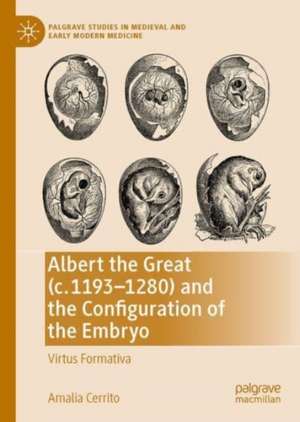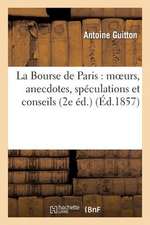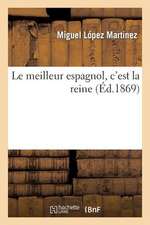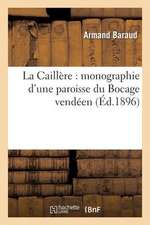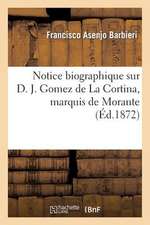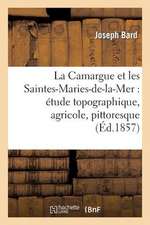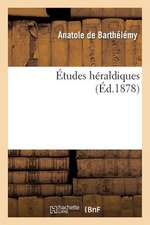Albert the Great (c. 1193–1280) and the Configuration of the Embryo: Virtus Formativa: Palgrave Studies in Medieval and Early Modern Medicine
Autor Amalia Cerritoen Limba Engleză Hardback – 28 sep 2023
Preț: 695.19 lei
Preț vechi: 817.88 lei
-15% Nou
Puncte Express: 1043
Preț estimativ în valută:
133.03€ • 139.24$ • 110.72£
133.03€ • 139.24$ • 110.72£
Carte tipărită la comandă
Livrare economică 31 martie-14 aprilie
Preluare comenzi: 021 569.72.76
Specificații
ISBN-13: 9783031240225
ISBN-10: 3031240227
Pagini: 171
Ilustrații: XI, 171 p. 1 illus. in color.
Dimensiuni: 148 x 210 mm
Greutate: 0.37 kg
Ediția:1st ed. 2023
Editura: Springer Nature Switzerland
Colecția Palgrave Macmillan
Seria Palgrave Studies in Medieval and Early Modern Medicine
Locul publicării:Cham, Switzerland
ISBN-10: 3031240227
Pagini: 171
Ilustrații: XI, 171 p. 1 illus. in color.
Dimensiuni: 148 x 210 mm
Greutate: 0.37 kg
Ediția:1st ed. 2023
Editura: Springer Nature Switzerland
Colecția Palgrave Macmillan
Seria Palgrave Studies in Medieval and Early Modern Medicine
Locul publicării:Cham, Switzerland
Cuprins
Chapter 1. Albert the Great’s Embryology: An Interdisciplinary Approach .- Chapter 2. The Christian-Neoplatonic Background of Albert the Great’s Doctrine of Virtus Formativa.- Chapter 3. Virtus Formativa and Human Embryology.- Chapter 4. The Transmission of Genetic Inheritance.- Chapter 5. Final Remarks.
Notă biografică
Amalia Cerrito is an Associate Member of the Centre for the Study of Medicine and the Body in the Renaissance (CSMBR) of Pisa, Italy. Having studied the history of medieval philosophy at the Universities of Pisa and Florence, she has published journal articles on the interaction between natural philosophy and the biblical exegesis of Albert the Great. Amalia’s recent publications are devoted to the theoretical background of Albert the Great’s natural philosophy and Neoplatonism’s influence on his theories of zoology, botany, and embryology.
Textul de pe ultima copertă
This book provides the first comprehensive treatment of Albert the Great’s (c. 1193–1280) notion of virtus formativa, a shaping force responsible for crucial dynamics in the formation of living beings. Crossing the boundaries between theology and philosophy, the notion of virtus formativa, or formative power, was central in explaining genetic inheritance and the configuration of the embryo. By adopting an interdisciplinary approach, this book reconstructs how Albert the Great, motivated by theological open issues, reorganised the natural-philosophical and medical theories on embryonic development, creatively drawing upon Greek, Patristic, and Arabic sources. A valuable contribution to research, this book offers essential insights for those studying the history of embryology, medicine, and science in the medieval and renaissance periods.
Amalia Cerrito is an Associate Member of the Centre for the Study of Medicine and the Body in the Renaissance (CSMBR) of Pisa,Italy. Having studied the history of medieval philosophy at the Universities of Pisa and Florence, she has published journal articles on the interaction between natural philosophy and the biblical exegesis of Albert the Great. Amalia’s recent publications are devoted to the theoretical background of Albert the Great’s natural philosophy and Neoplatonism’s influence on his theories of zoology, botany, and embryology.
Amalia Cerrito is an Associate Member of the Centre for the Study of Medicine and the Body in the Renaissance (CSMBR) of Pisa,Italy. Having studied the history of medieval philosophy at the Universities of Pisa and Florence, she has published journal articles on the interaction between natural philosophy and the biblical exegesis of Albert the Great. Amalia’s recent publications are devoted to the theoretical background of Albert the Great’s natural philosophy and Neoplatonism’s influence on his theories of zoology, botany, and embryology.
Caracteristici
Offers the first extensive and interdisciplinary treatment of the theory of genetic inheritance Appeals to scholars across a range of disciplines, including history, philosophy, and theology Contributes to growing research into the relationship between philosophy and medicine
